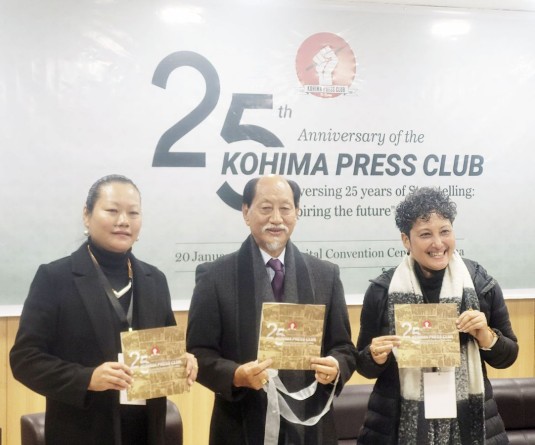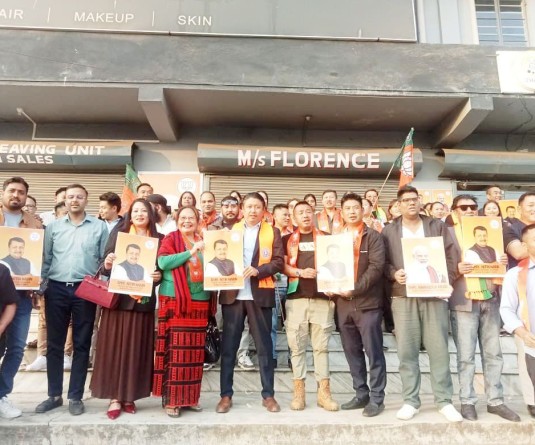
Dimapur, July 3 (MExN): The unequivocal opposition to any proposal to implement a Uniform Civil Code (UCC) gained further momentum in Nagaland with more organisations on Monday voicing out against any such move.
On July 3, the Naga Hoho, the Nagaland Gaonburas (Village Chief) Federation (NBGF), Lotha Baptist Churches Association (LBCAA) and Sumi Hoho issued separate statements stating their stances.
Naga Hoho: Any attempt to enforce a one-size-fits-all approach would undermine the constitutional provisions, unique history, and indigenous culture and identity of the Nagas, as well as the principles of unity in diversity India, the Naga Hoho stated.
Concerning the Nagas, a press release from the Naga Hoho President HK Zhimomi highlighted that Article 371 (A) of the Constitution of India recognises the special status and rights of the Nagas.
These include rights to maintain the social, cultural, and religious practices and administration of civil and criminal justice involving decisions according to customary law and ownership of land and its resources, ensuring their protection against any potential impingement, it underscored.
This constitutional safeguard is essential in respecting the distinctiveness and autonomy of the Nagas, acknowledging their historical journey, and upholding their fundamental rights, it added.
The Naga Hoho further pointed out that Nagas have a rich and diverse cultural heritage evolving over centuries and the traditional institutions, customary laws, norms and practices have played a vital role in maintaining social harmony and ensuring the well-being of the Naga communities.
Accordingly, imposing the UCC without taking into account the unique cultural and historical context would be tantamount to erasing their identity and diluting their cherished traditions, it asserted.
Furthermore, it stated that India's strength lies in its unity in diversity and it is not only celebrated but also protected by the Constitution, which enshrines the principle of pluralism.
Imposition of the UCC would overlook the diverse needs and aspirations of different communities and undermine the very essence of this unity in diversity, the Naga Hoho highlighted.
It further highlighted that the on-going Indo-Naga political talks, which seek to address the long-standing issues and aspirations of the Naga people based on mutual respect, understanding, and a commitment to finding a sustainable solution that respects the unique historical identity and rights of the Nagas.
In this connection, the Naga Hoho urged the government and all concerned stakeholders to reconsider the imposition of a UCC and instead foster an environment that respects and safeguards the diverse cultural identities and traditions across the country.
NGBF: The NGBF, meanwhile, stated its strong opposition to the proposal to implement the UCC in Nagaland “under any circumstances.”
Expressing apprehension that the UCC might be possibly tabled during the upcoming monsoon session of the Parliament, the federation said that its implementation is “likely to subsume all personal laws in the country.”
Currently, such issues coming within the definition of a 'civil code' under Indian law are governed by separate provisions under religious customary laws or codified laws pertaining to each religion in India, it noted.
If UCC comes into force, all autonomy given under these provisions until now will be irrelevant, asserted a press release issued by NGBF General Secretary Shikuto Zalipu and Media Secretary Akhu Naga.
It further stated that Nagaland has a unique and diverse culture, traditions and its practices, and these have been recognised and protected under Article 371 (A).
Enforcing anything other than that is a direct violation to the provision of the Constitution of India and implementation of the UCC in Nagaland would dilute the entire system and result in perplexity and chaos, it added.
Representing grassroots people of Nagaland, the NBGF accordingly declared that it ‘disowns and opposes the proposal of UCC in Nagaland’ and urged the Union Government to keep the State outside its purview.
“We have our history that enables us to say ‘No’ to UCC. We Nagas are Indian not by choice but by compulsion,” it added.
LBCA: Concurring with many other organisations that India is a great Nation of diverse culture having diverse religious practices, the LBCA stated that any forcible attempt to introduce a UCC throughout would be seen as a move to “destabilise the greatness and uniqueness of our great nation.”
It is very much evident that due to introduction of the proposed UCC, many minority groups in India will be marginalised and will be deprived of their customary practices and sacred religious faiths and beliefs, the Association maintained.
Any move to impose a UCC would “only result in the fall of this great Indian Nation,” it added.
Accordingly, the LBCA extended its full endorsement to the Nagaland Baptist Church Council(NBCC) in the “fight against extending” the proposed UCC in Nagaland.
The Association further affirms to stand steadfastly with NBCC till the introduction of this law in our land is defeated, stated a press release from the LBCA President Rev Dr E Nrio Ezung and Executive Secretary, Rev Khonbemo P Kikon
The NBCC had rightly pointed out that the introduction of ‘UCC will ensure uniformity in law which will be applied to all citizens, regardless of their religious or customary background,’ it said.
The Constitutional provisions guaranteeing religious freedom and belief will be done away with, and the major brunt of which will be felt by the religious minorities who are also the sons of the soil, it added.
In the context of Nagaland, it further underscored that the State came into being out of “Political Agreement through the 16- Point Agreement” recognising unique history of the Nagas duly by GoI by under Article 371 (A).
“This is a hard-earned provision, and every right thinking citizens of Nagaland must come forward to oppose the extension of UCC in our land,” the LBCA asserted.
Sumi Hoho: The implementation of UCC would have significant negative consequences for the tribal people, as well as other minority communities in India, Sumi Hoho stated in a representation to Member Secretary, Law Commission of India.
Any imposition of the UCC would directly violate the special status accorded to the people of Nagaland under by Article 371A, it further noted.
Moreover, the introduction of UCC would undermine the core principle of unity in diversity enshrined in the Indian Constitution and render the concept of a federation of the Indian union meaningless, added representation signed by Sumi Hoho President I Nikheto Jimomi and General Secretary Dr Vihuto Asumi.
“The UCC represents a threat to the religious freedom and cultural rights of minorities, which are fundamental rights guaranteed to every Indian citizen,” it asserted.
Besides, it highlighted that Nagas, being distinct in their religious beliefs and social practices, are unfamiliar with many traditions prevalent on the mainland.
“Any attempt to impose laws against the will of the people would be undemocratic and unacceptable,” the Sumi Hoho stated, declaring its strong opposition to the implementation of the UCC in Nagaland.





